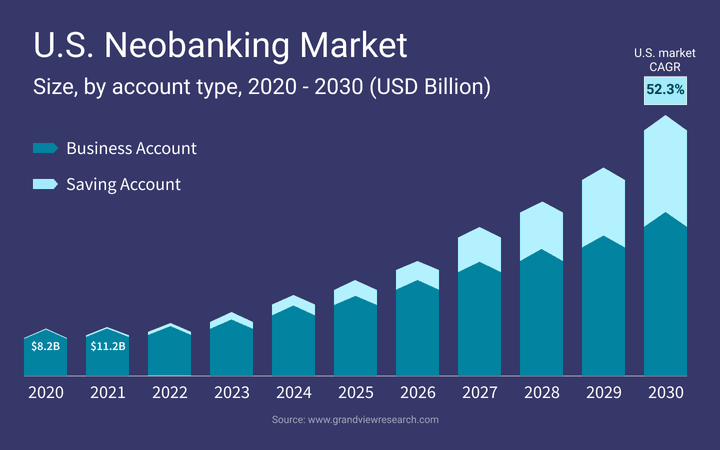The banking landscape has been undergoing significant transformations in recent years, and at the heart of this shift is the rise of neobanks. These digital-first, branchless financial institutions have gained tremendous momentum, attracting millions of customers and transforming how we think about banking. But what does this growth mean for traditional banks and, more importantly, for the future of employment within these established institutions? Let’s explore the rapid expansion of neobanks and what it could mean for the future of banking careers.
Understanding Neobanks: A New Era of Banking
Neobanks are financial technology companies that offer banking services exclusively through digital platforms. Unlike traditional banks, which operate physical branches, neobanks focus on providing streamlined, user-friendly, and mobile-centric banking experiences. Many of these institutions are entirely online, meaning customers can manage their accounts, transfer funds, and access a variety of financial services without ever stepping foot into a bank branch.
Some of the most notable neobanks in the U.S. include Chime, Revolut, and Varo. These companies have become popular because of their low fees, ease of use, and innovative features such as savings tools, personalized budgeting advice, and instant peer-to-peer payments. Furthermore, neobanks tend to cater to a tech-savvy, younger demographic, positioning themselves as more nimble, efficient, and customer-centric than traditional banks.
The Growing Popularity of Neobanks
The COVID-19 pandemic played a pivotal role in accelerating the shift towards digital banking. With people staying at home and avoiding physical locations, many turned to online banking solutions. This increase in demand for digital services has significantly boosted the growth of neobanks. In fact, according to a 2022 survey, the number of neobank customers in the U.S. reached over 30 million—a staggering rise from previous years.
Neobanks are capitalizing on the growing consumer demand for convenience and flexibility. As mobile banking apps become more sophisticated, customers expect seamless, 24/7 access to their accounts. Traditional banks, which have often been slower to adopt new technologies, are now feeling the pressure to innovate in response to the rise of neobanks. This digital shift has led to increased competition and the need for traditional banks to rethink their strategies.
Impact on Employment in Traditional Banks
As neobanks continue to gain ground, the implications for traditional banks are far-reaching, particularly in terms of employment. The biggest change we’re likely to see is a shift in the types of jobs available within traditional banks. Many traditional roles, such as bank tellers and customer service representatives, may gradually decline as banking moves online. In fact, a 2021 report by the consulting firm McKinsey & Company suggested that automation and digital banking solutions could lead to the loss of over 1 million jobs in traditional banks globally by 2030.
However, while certain roles may be automated or streamlined, new types of jobs are also emerging. As traditional banks increasingly adopt digital platforms and embrace the neobank model, there will be greater demand for tech-savvy professionals. This includes positions such as data analysts, cybersecurity experts, app developers, and customer experience managers. Banks will need a workforce that is well-versed in technology, innovation, and digital transformation.
Moreover, traditional banks are also investing heavily in their digital infrastructure to compete with neobanks. This shift opens up opportunities in project management, digital strategy, and software engineering. In fact, some of the largest U.S. banks, including JPMorgan Chase and Bank of America, have made significant investments in fintech innovation, creating job opportunities in areas like blockchain development and AI-driven customer service solutions.
What Does This Mean for Aspiring Bankers?
For those looking to build a career in banking, the rise of neobanks presents both challenges and opportunities. Traditional banking institutions are increasingly looking for employees who possess a blend of traditional banking expertise and digital skills. Aspiring bankers should consider developing expertise in areas such as:
-
Fintech Knowledge: Understanding how digital banking operates, including the technologies and innovations that drive it, is crucial.
-
Data Analytics: As data plays a pivotal role in modern banking, those who can analyze customer behavior, trends, and insights will be in high demand.
-
Cybersecurity: As more banking services move online, the need for cybersecurity professionals to protect customer data is greater than ever.
-
Agile Methodologies: As traditional banks evolve and adopt new technologies, professionals who are skilled in agile methodologies will be sought after for their ability to manage projects efficiently.
-
Customer Experience Management: As digital-first banking becomes more common, ensuring an excellent customer experience online will be key to success. Professionals who can manage digital customer relations will have an edge.
Conclusion
The rise of neobanks is not just a passing trend but a clear indicator of where the future of banking is headed. While traditional banks may face challenges in maintaining their dominance, they are also adapting and evolving, creating new job opportunities in the digital age. For those seeking a career in banking, the key to success will be to embrace the digital transformation and gain the skills necessary to thrive in a tech-driven, customer-centric financial world.






